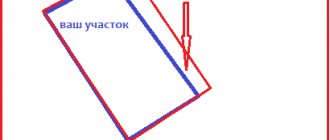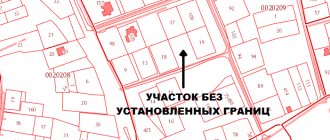Important aspects
Alienation of land plots is the loss by the owner of property rights in relation to the land plot. This procedure takes place within the framework established by the law of the Russian Federation. Ownership of a land plot can be held by an individual, a legal entity, a municipality or the state as a whole. The owner of this plot has full right to dispose of this plot: donate, sell, re-register, give for use. A citizen can either voluntarily give up a plot of land or not of his own free will (forcibly).
Types and conditions of alienation of a plot of land
At the legislative level, there are several types of alienation, including:
- Compulsory, which is carried out regardless of the will of the landowner. This transfer of ownership takes place when the court makes a decision on confiscation of the site.
- Voluntary, carried out at the own will of the landowner. This is the most common option for alienation, which is formalized in the form of a transaction between the parties.
- Gratuity is usually carried out through the execution of a will. In addition, this method of alienation of property in the form of a land plot takes place during the confiscation of an object.
- Compensation is carried out during a transaction, the purchase and sale of a plot, its withdrawal to a state fund, as well as when transferring an object as an inheritance, subject to provision of lifelong maintenance.
Separately, the mandatory conditions for the alienation of a plot are considered, to which the Land Code of Russia includes the following:
- Transfer of ownership of land ownership and, accordingly, land use of the site to another person. Such an action must necessarily be carried out within the framework of legal relations regulated by civil law.
- All legal frameworks of legislation must necessarily take into account the negotiability of land.
- The owner of the site must independently renounce all rights to this property.
What it is
According to the Civil Code of the Russian Federation, alienation of a land plot is a transaction that must be formalized in the manner prescribed by law; as a result, ownership rights are transferred from the owner to another person.
Lease of land plots or trust management of land rights cannot be considered alienation, since the owner remains the same. And:
- Land can be taken away from the owner by court decision, when his consent is not required at all.
- Alienation of land is classified on the basis of paid transfer of rights.
Ownership of a given land object can be transferred to any citizen for a certain compensation to the owner. If the owner does not receive anything during the transfer of ownership rights, then such a transaction is called gratuitous.
Alienation, like any legal procedure, must be regulated and has its own nuances. If the rules are not followed, it may be declared invalid.
The procedure for forced seizure of a land plot
The seizure of a land plot within the framework of the law occurs in several stages. Each of them is mandatory. In case of any violation, the owner has the right to go to court to restore the violated rights. The procedure can be described step by step as follows:
- Initiating the withdrawal process. Authorities at any level can launch it. The owner is sent a notification letter about the date of verification of the intended purpose of the land. Unscheduled inspections may also be carried out.
- Search for owner.
- Making a decision on confiscation. Based on the initiative, the authorized bodies make a decision on the seizure of land. The resolution indicates the reason for the confiscation, the owner from whom the plot is confiscated, as well as the details of this plot: area, cadastral number and others that make it possible to initiate a specific territory.
- Written notice to the owner that the land will be expropriated for cause. In parallel with this, the executive bodies publish information in the media with data on the seized property.
- An agreement is being developed. Only after reaching all agreements, a document is drawn up, which indicates all the features of the procedure, indicating the deadlines. The condition for replacing lost property is also stated here.
- The land plot is alienated and the rights to it are transferred. If the confiscation does not occur as a result of a court decision, according to which the compensation of funds to the injured person will occur, then the owner of the land has the right to demand compensation. It is calculated according to the market valuation in force in a specific territory. Instead of monetary compensation, the copyright holder who has lost property may be offered a replacement equal in area or price.
After notification, the property owner has 3 months to make a decision. During this time, he may agree to the terms of the seizure, the amount of compensation, or replacement with a similar plot. Otherwise, contact the judicial authorities with a claim of violated rights. As practice shows, state authorities have all legal grounds for confiscation of a land plot and the court makes a decision in favor of the state.
If the land has not been registered, the owner is given only 2 months to prove his rights regarding the allotment. He is obliged to submit the title documents and application to the administration. Otherwise, the land will be declared ownerless and transferred to the municipality.
As for compensation for lost property, it consists of several components:
- market valuation of the site itself;
- immovable objects located within the boundaries of the allotment. It should be noted here that compensation for them is possible only if the permitted use of the land involves the placement of such objects on them;
- lost profits that could have been received by the owner in connection with the use of the land, again in accordance with the permit;
- other amounts of damages.
In the event that real estate objects were not registered as legal property, no compensation is provided for them. Since they will be recognized as unauthorized construction and subject to demolition.
If the authorities have other property at their disposal in terms of value, it may be offered to the owner in exchange for what was lost during seizure. Another option is cash, the amount of which is made up of the above components.
Why is this happening
The alienation of a land plot must be carried out in accordance with the Land Code of the Russian Federation, which stipulates the regulations and restrictions on land plots.
There is a list of land plots that are not subject to alienation:
- nature reserves;
- burial sites;
- strategic objects;
- other.
This transaction must be documented. When voluntarily transferring ownership rights, the parties must have the contract certified by a notary. If the alienation is forced, then the basis for such a procedure will be a document that describes the reason for the alienation, the grounds and the court decision.
A mandatory condition for completing the alienation procedure is the registration by the new owner of ownership rights to the land plot. According to the law, it is necessary to make changes to the Unified State Register.
Regulatory regulation
According to Article 52 of the Land Code of the Russian Federation, the alienation procedure has its own procedure and conditions.
Thus, this procedure should take place within the framework of civil law transactions. The basis for the transaction may also be a court decision or an administrative act.
According to Article 27 of the RF LM, there are certain restrictions on the defense capability of land plots. As we have already indicated above, there are lands that are not subject to alienation.
According to Article 37 of the Land Code of the Russian Federation, the owner must provide all the necessary information about the land plot during the purchase and sale procedure, and the parties must comply with all the conditions specified in the contract. It is also worth noting that the parties must specify in the contract in what situations the contract may be considered invalid.
The Federal Law “On the Turnover of Agricultural Land” stipulates in more detail all the points on the basis of which the purchase and sale of land plots specifically for agricultural purposes occurs.
What are the types
Alienation of land plots can be of the following types:
- voluntary;
- forced.
For the most part, this is a classification based on the subject of the procedure.
Voluntary
On a voluntary basis, alienation can be:
- at the will of the owner of the land plot with the transfer of ownership rights to the municipality or the state;
- on the basis of civil law transactions of a compensated nature;
- free of charge.
In the first case, alienation can only be on the grounds provided for in the laws of the Russian Federation. What could they be?
- when the land plot was privatized;
- as a result of the sale of a plot through an auction;
It is imperative to draw up an agreement on the transfer of rights to the site and register it with Rosreestr. Voluntary alienation implies the fact that all rights and obligations, and the current condition of the land plot are completely transferred to the new owner.
Forced
If the alienation of a land plot occurs forcibly, it is important to understand on what grounds:
- land is taken for state needs;
- seizure of land due to the owner using the land for other purposes or violating land use rules;
- confiscation by court order due to a criminal case;
- seizure due to unforeseen circumstances (martial law).
The law provides for compensation in monetary terms if the land plot was seized through no fault of the owner. The calculation will be carried out according to the cadastral value of the land plot.
Alienation of territory by free will
The owner of the land plot is provided with a full list of powers related to the disposal of the object in question. The cheat sheet suggests that a citizen or enterprise has the opportunity to choose different ways to sell their property. If we analyze the provisions contained in civil legislation, we can note that several different methods of alienation are used. These include voluntary renunciation of the site and rights to it. This means that the land is subject to return to the ownership of a municipal or state body. In addition, the owner can make transactions for compensation. For example, this is buying and selling. These actions may also be gratuitous, which indicates the use of transactions such as donation.
As a result of the above options, the new owners acquire ownership rights. If the territory is classified as the property of the state or municipality, then it is necessary to alienate it only when using the grounds prescribed in legislative acts. In particular, in this case we are talking about privatization. It is understood as the transfer of land to people, without having to pay for it. The allotment can be sold during the bidding process or without it. In addition, the use of other methods of alienation is permitted. The person who is vested with ownership rights in relation to the allotment has the opportunity to independently determine which of the above options to use. He may or may not charge for the land.
ATTENTION !!! Legislative acts do not contain restrictions regarding the right to transfer plots free of charge to third parties. This is allowed even in a situation where there is no family relationship between the parties to the transaction.
In this situation, it is important to understand that general rules related to the alienation of land plots must be observed. They are prescribed in the Civil Code of the Russian Federation. Completing the registration process becomes a mandatory requirement. To do this, you need to contact the registration authority, which reviews Rosreestr. Then the updated data regarding the owner of the site is recorded in the registers. In addition, it is important to take into account that for the purpose of alienation it is necessary to generate a certain type of document. It can be unilateral or bilateral.
Prerequisites
Alienation of a land plot with the transfer of ownership rights to another person must comply with the mandatory conditions that are prescribed in the laws of the Russian Federation:
- any agreements must be agreed upon by the parties;
- alienation takes place on a plot that is indicated in the cadastral plan;
- the transaction can be carried out either by the owner of the land or by an authorized representative (there must be a power of attorney from a notary);
- Only that plot of land that is not prohibited by the legislation of the Russian Federation can be alienated;
- in case of forced alienation, the reasons and grounds must be indicated.
Latest news in 2021
Significant changes in legislation affected Federal Law No. 218-FZ “On State Registration of Real Estate”. Now all real estate must undergo cadastral registration and the registration databases must contain information about the owner. At the same time, all lands that have not undergone re-registration and are not included in the Unified State Register of Real Estate risk being confiscated.
It should be noted that the authorities will not immediately take away land from citizens. First, measures will be taken to notify the owner and offer to register in a new format. If this does not happen, the site will be considered abandoned. The basis for this is a court decision if the owner of the land did not appear at the meeting or voluntarily renounced the rights to it. Then this plot will be transferred to the municipality for further disposal at its discretion.
The fate of land seizure could also affect summer residents who built residential buildings and other capital buildings on their plots, but did not register them, starting in the summer of 2021. The dacha amnesty, announced to legalize such buildings under a simplified scheme, has been extended until the spring of 2021. This makes it possible to undergo state registration of houses without a building permit. Without receiving title documents for the land and the buildings on it, the owner may legally lose this property.
In 2021, the State Duma adopted a number of amendments to legislative acts regarding unauthorized construction. The owner on whose land there is an illegal building will first be ordered to demolish it. If this requirement is not fulfilled within the prescribed period, in addition to a fine, which can reach up to 50 thousand rubles, the plot may be seized. Self-construction can include not only a residential building, but also other buildings on a plot of land that are not registered in Rosreestr.
Step-by-step instruction
This procedure has a number of actions that must be followed during voluntary alienation:
- take an extract that will indicate ownership of this plot of land;
- conduct an assessment of the land plot;
- obtain a cadastral passport;
- obtain the consent of Rosreestr to carry out this transaction;
- obtain certificates for requisition if there are buildings on the territory of the land plot;
- to make an agreement;
- sign the agreement by the parties;
- have the agreement (contract) certified by a notary;
- register the transaction in Rosreestr.
Emerging nuances
During this transaction, some nuances may arise:
- Firstly, as a result of alienation, the owner has a ban on any actions related to this site.
- Secondly, the owner can no longer derive any benefits from the land.
Thirdly, the owner no longer has any responsibilities associated with ownership of the plot, namely:
- no need to pay taxes;
- no need to carry out technical measures;
- there are no more encumbrances on the land.
Regarding part of the territory
Is it possible to alienate part of the territory? According to the legislation of the Russian Federation, the alienated share of a land plot must be allocated and only then can it become an object that is subject to any manipulation. The owner can dispose of the allocated share at his own discretion.
The only point that should be taken into account is the fact that if the owner decides to sell his share, then the priority of purchase will be with the other shared owners of this plot.
Privately owned
If a citizen wants to carry out the procedure for the alienation of a land plot that belongs to him by right of private property, then the procedure can occur in the following cases:
- if his desire is voluntary and he wants to transfer the plot to another person;
- if the owner decided to abandon the land plot;
- if the plot is forcibly alienated in accordance with the procedure established by law.
Without land surveying
According to the new laws of the Russian Federation, it is impossible to carry out any procedure for transferring property rights without previously established land surveying. The force of this law extends to:
- garden plots;
- private plots;
- summer cottages;
- vegetable gardens;
- plots of individual housing construction.
If the site does not have a land survey plan, and its boundaries are not legally established, then it cannot be given, sold, or exchanged.
Without a building on it
According to the Land Code of the Russian Federation, all buildings on land plots are inextricably linked with the land plot itself.
There is a procedure when lands and buildings on them can be alienated separately:
- if some part of the building is alienated, which cannot be allocated along with the share of land;
- if the building that is subject to alienation is located on a land plot that is withdrawn from circulation.
We are often contacted with questions regarding state registration of rights to land shares, including the question of the possibility of selling or donating a land share, namely, to whom can a land share be sold or donated? Is the owner of a land share limited in exercising his right of ownership when selling or donating a land share?
Land share, the rights to which arose during the privatization of agricultural land before the entry into force of the Federal Law “On the turnover of agricultural land” dated July 24, 2002. N 101-FZ (hereinafter referred to as the law on turnover), is a share in the right of common ownership of land plots of agricultural land. (clause 1 of article 15 of the law on turnover).
According to Art. 77 of the Land Code of the Russian Federation (hereinafter referred to as the Land Code of the Russian Federation), agricultural lands are lands outside the boundaries of settlements, provided for agricultural needs, as well as intended for these purposes. Relations related to the ownership, use, and disposal of agricultural land plots are regulated by the law on turnover. The law establishes the rules and restrictions applicable to the turnover of land plots and shares in the right of common ownership of land plots from agricultural lands and shares in the right of common ownership of land plots from agricultural lands. The effect of this law does not apply to land plots provided from agricultural lands to citizens for individual housing, garage construction, personal subsidiary and dacha farming, gardening, livestock farming and gardening, as well as to land plots occupied by buildings, structures, and structures. The turnover of these land plots is regulated by the Land Code of the Russian Federation, as well as the Federal Law “On horticultural, gardening and dacha non-profit associations of citizens.”
As stated in paragraph 2 of Art. 1 of the Law on Turnover, legal regulation of relations in the field of turnover of land plots and shares in the right of common ownership of land plots from agricultural lands is carried out by the Constitution of the Russian Federation, the Land Code of the Russian Federation, the Civil Code of the Russian Federation, the law on turnover, other federal laws, as well as adopted in compliance with them with other regulatory legal acts of the Russian Federation and the laws of the constituent entities of the Russian Federation.
In accordance with paragraph 3 of Art. 3 of the Land Code of the Russian Federation, in Art. 12 of the Land Turnover Law establishes the specifics of transactions with shares in the right of common ownership of a land plot of agricultural land (land shares). Such features are not established in the Civil Code. These features are allowed to apply if the number of participants in shared ownership exceeds five.
The legislator determined in paragraph 1 of Article 12 of the Law on Turnover the specifics of transactions with shares in the right of common ownership of a land plot from agricultural lands, in particular, indicated that transactions made with shares in the right of common ownership of a land plot from agricultural lands , if the number of participants in shared ownership of this land plot exceeds five, the rules of the Civil Code of the Russian Federation are applied taking into account the specifics established in Articles 12 - 14 of the Law on Turnover.
Without allocating a land plot on account of the land share, such a participant in shared ownership, at his own discretion, has the right to bequeath his land share, renounce the right of ownership of the land share, contribute it to the authorized (share) capital of an agricultural organization using the land plot that is in shared ownership, or transfer your land share into trust management or sell or donate it to another participant in shared ownership, as well as an agricultural organization or a citizen - a member of a peasant (farm) enterprise using a land plot that is in shared ownership. (paragraph 2, part 1, article 13 of the law on turnover).
In fact, this legal norm abolished the rules of Art. 250 of the Civil Code of the Russian Federation on the preemptive right of other participants in shared ownership to purchase a land share in the event of alienation of such land share by a participant in shared ownership, since both participants in shared ownership, and an agricultural organization, and a citizen - a member of a peasant (farm) farm received equal rights to purchase of a land share. At the same time, additional requirements are imposed on the agricultural organization and the citizen - member of the peasant (farm) enterprise: at the time of purchasing a land share, they must use the land plot that is in shared ownership, for example, on a lease basis, including if the lease agreement is concluded for a period less than one year without its state registration.









